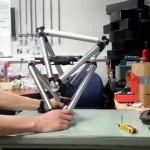 In a recent post I looked at a project being undertaken by researchers at Leeds University to develop robots that were capable of monitoring, analyzing and repairing various facets of city life, whether that be potholes or streetlights, utility pipes or pavements.
In a recent post I looked at a project being undertaken by researchers at Leeds University to develop robots that were capable of monitoring, analyzing and repairing various facets of city life, whether that be potholes or streetlights, utility pipes or pavements.
The project is clearly tapping into a zeitgeist of sorts, as a similar venture is being undertaken by researchers at the University of California, San Diego.
They have develop a robot, called DucTT, that is designed to maintain duct pipes even whilst the pipes are in operation and therefore full of gas or liquid.
Automated maintenance
The project was documented in a recent paper, and consists of tensegrity robots that a both light and flexible. The machine is made from rigid aluminium tubes and cables that help to maintain the integrity of its structure.
All of the sensors, motors and various electronics is embedded within the tubes of the structure to ensure that they’re protected from the contents of the duct tubes as the robot is navigating them.
The device moves along the tube in inchworm-like fashion and can move in any direction. The batteries within the machine give it a life of six hours continuous use before needing to be recharged.
Cleaning robots
Ensuring duct pipes are clean is crucial to ensure good air quality indoors. The World Health Organization estimate that we spend the vast majority of our time indoors, and indoor air can be more densely polluted than outdoor air.
It’s believed that as many as 30 percent of buildings have some kind of air quality issue, with the Environmental Protection Agency pinning the cost of these issues at $60 billion per year for businesses alone.
Indeed, it’s believed that workers in an office where air conditioning and heating systems are not cleaned regularly are 60 percent more likely to suffer from respiratory problems.
With existing automated systems proving rather unsatisfactory, the research team hope that DucTT can help address a crucial need for facilities managers throughout the world.
Check out the video below for lead researcher Jeffrey Friesen’s thoughts on the project.
I don't know why, but I just think of Aliens.